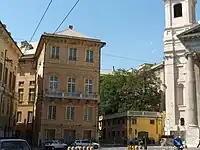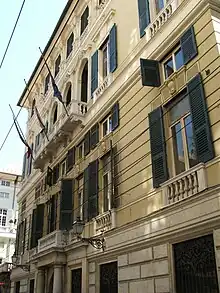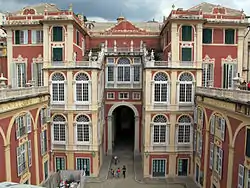Via Balbi (Genoa)
Via Balbi is a street in the historical centre of Genoa, in Northwestern Italy, named after the aristocratic Genoese Balbi family. It is one of the Strade Nuove (Italian for "new streets")[1] built by the Genoese aristocracy during the Renaissance. Since July 2006 it is inscribed in the list of UNESCO World Heritage Site Genoa: the Strade Nuove and the system of the Palazzi dei Rolli.[2]
Strada Balbi | |
 Via Balbi | |
| Location | Genoa |
|---|---|
| Region | Liguria |
| Coordinates | 44.415017°N 8.926264°E |
| Official name | Genoa: The Strade Nuove and the system of the Palazzi dei Rolli |
| Type | Cultural |
| Criteria | (ii)(iv) |
| Designated | 2006 |
| Reference no. | 1211 |
| Region | Italy |
History
Formerly known as Strada Balbi, the street was built between 1602 and 1620 as a cooperation between the city authorities and the Balbi family to improve the connection between the city center and the area around the harbor.[3][4]
Between the first half of the 16th century and the first half of the 17th century, the nobility of the Republic of Genoa started a careful town planning to transform the existing medieval city and initiate a sizeable urban expansion to the North. The move to expand the antique palaces and to build new sumptuous ones was driven by the extraordinary wealth that came into the city through prosperous financing activities towards several European powers. In particular, the Genoese aristocracy financed the expensive undertakings of the Spanish Crown, such as the mercenary army that Spain kept in Flanders from 1566 to the peace of Westphalia in 1648. The ruling class of Genoa, mixing nobility of blood with new mercantile wealth, sought to underpin their prestige by the construction of grand city palaces and suburban villas of unusual splendor.[2][3]
The first stretch of the street includes seven palaces, all formerly owned by the Balbi family, the former Collegium of the Jesuits (now the main seat of the University of Genoa) with the church of San Girolamo e Francesco Saverio and the Carmelite church of San Vittore e Carlo. The final stretch, which used to count eight 17th century monasteries, was modified in the 19th century, when the nearby train station of Genova Principe was built.[4]
Palaces listed as a UNESCO World Heritage Site
| No. on the UNESCO list | Original Owner | Location | Current name of the Palace | Photo |
|---|---|---|---|---|
| 26 | Gio. Agostino Balbi | Via Balbi, 1, Genoa | Palazzo Durazzo Pallavicini | .jpg.webp) |
| 27 | Gio Francesco Balbi | Via Balbi, 2, Genoa | Palazzo Balbi Cattaneo |  |
| 28 | Giacomo and Pantaleo Balbi | Via Balbi, 4, Genoa | Palazzo Balbi Senarega |  |
| 29 | Francesco Balbi Piovera | Via Balbi, 6, Genoa | Palazzo Balbi Piovera Raggio |  |
| 30 | Stefano Balbi | Via Balbi, 10, Genoa | Royal Palace of Genoa |  |
Quotes
Taking a letter to Mrs Mojon, in Strada Balbi; this is one of the three names of one long street, which is also the most beautiful in Italy
— Stendhal, Journal d'un voyage en Italie et in Suisse pendant l'annee 1828
- Charles Dickens gave a suggestive description of Strada Balbi in his travelogue Pictures from Italy.[3]
...When shall I forget the Streets of Palaces: the Strada Nuova and the Strada Balbi!
— Charles Dickens, Pictures from Italy
Gallery
See also
References
- "Elenco Strade Nuove". irolli.it (in Italian).
- "Sito UNESCO".
- Le Strade Nuove (in Italian). Genova: SAGEP Editrice. 1986.
- Guida d'Italia, Liguria (in Italian). Touring Club Italiano. 2009. pp. 166–171.
Bibliography
- Giorgio Doria (1995), Nobiltà e investimenti a Genova in Età moderna, Genova
- Gioconda Pomella (2007), Guida Completa ai Palazzi dei Rolli Genova, Genova, De Ferrari Editore(ISBN 9788871728155)
- Mauro Quercioli (2008), I Palazzi dei Rolli di Genova, Roma, Libreria dello Stato (ISBN 9788824011433)
- Fiorella Caraceni Poleggi (2001), Palazzi Antichi e Moderni di Genova raccolti e disegnati da Pietro Paolo Rubens (1652), Genova, Tormena Editore (ISBN 9788884801302)
- Mario Labò (2003), I palazzi di Genova di P.P. Rubens, Genova, Nuova Editrice Genovese




.jpg.webp)


_01.jpg.webp)
_16.jpg.webp)

